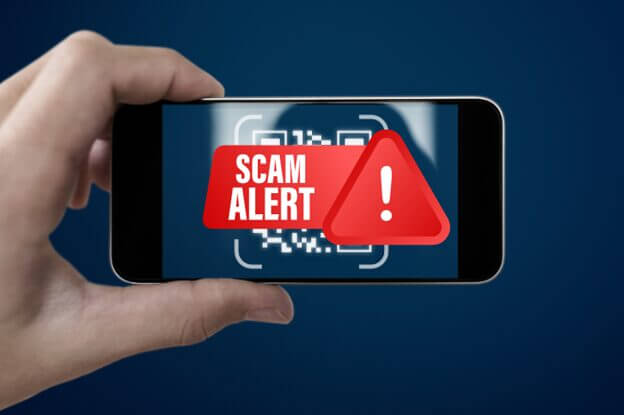What are QR Codes?
QR codes (Quick Response codes), invented in 1994 by Denso Wave, are matrix barcodes consisting of black squares on a white background. They can store various data types and are widely used for product tracking, document management, and marketing due to their versatility and high data capacity.
What Are QR Code Scams?
QR code scams involve malicious QR codes that trick users into revealing personal information or downloading harmful software. Scammers often replace legitimate QR codes with fake ones in public places, online ads, or emails. When scanned, these codes can lead to fraudulent websites or prompt malware downloads.
How Do QR Code Scams Work?
Scammers use several tactics to deceive victims into scanning fake QR codes:
- Fake QR Scanners: Scammers often develop fake QR code scanning apps that mimic legitimate ones, tricking users into thinking they are securely scanning QR codes. These apps can install malware on your device or redirect you to counterfeit websites designed to collect sensitive personal information, such as login credentials or financial details. To protect yourself, it’s important to use your phone’s built-in camera app, which is designed to scan legitimate QR codes safely. Avoid downloading third-party QR code scanners, as they may not have the same security protections and could expose you to potential risks.
- Phishing Websites: Scammers create fake sites resembling legitimate ones like your bank. Scanning the QR code redirects you to these sites, where you might unknowingly enter sensitive information like login credentials or credit card details.
- Malware Downloads: Some QR codes initiate malware downloads that can steal data, monitor your activities, or lock your device until a ransom is paid.
- Fake Payment Portals: Scammers replace genuine QR codes at payment terminals, redirecting payments to their accounts instead of the intended recipient.
How to Protect Yourself from QR Code Scams
- Verify the Source: Always ensure the QR code comes from a trusted source. Check for signs of tampering in public places and verify the sender’s identity if received via email or message.
- Use Secure QR Code Scanners: Some apps scan QR codes and check the safety of the URL before you visit it, offering an extra layer of protection.
- Be Wary of Shortened URLs: QR codes linking to shortened URLs can obscure the destination site. Use scanners that preview the full URL or type the URL manually if unsure.
- Avoid Entering Sensitive Information: Legitimate businesses rarely request personal or financial information via QR codes. Be cautious when prompted for such details.
- Stay Informed: Keep up with the latest updates on QR code scams and other cybersecurity threats.
- Use Secure Payment Methods: Opt for secure payment methods like credit cards or payment apps with fraud protection. Avoid making payments through unfamiliar QR codes.
How We Protect You
We take your security seriously. Our team continuously monitors fraudulent activities and educates members about potential threats. If you encounter a suspicious QR code or believe you’ve fallen victim to a scam, contact us immediately. We’re here to help ensure your financial safety.

